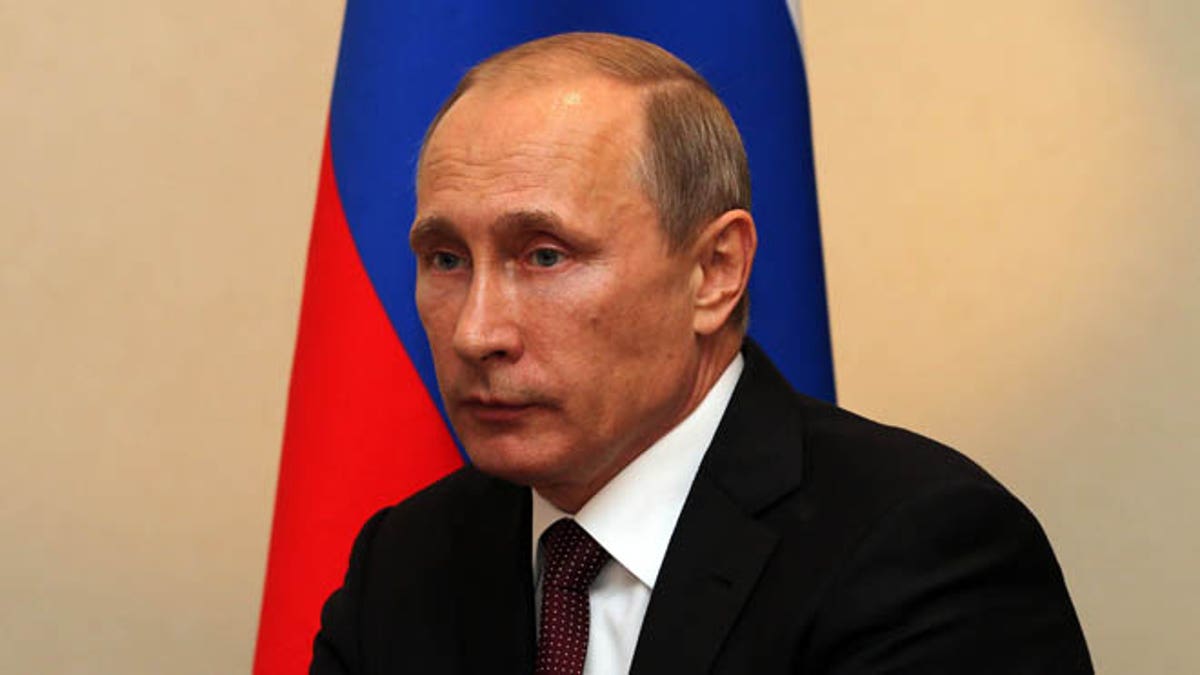
June 24, 2014: Russian President Vladimir Putin is shown in Vienna, Austria. (AP)
The Obama administration could reconsider a looming package of sanctions on the Russian economy as Vladimir Putin makes an about-face and signals a willingness to ease the crisis Moscow helped create in Ukraine.
In recent days, Putin has worked with lawmakers in Moscow toward rescinding a parliamentary resolution authorizing him to use the Russian military in Ukraine -- the parliament's upper house canceled it on Wednesday. Putin also urged the new Ukrainian government to extend a weeklong cease-fire and called for talks between Ukraine and pro-Russian rebels who are widely believed to be backed by the Kremlin.
Asked about the developments, White House Press Secretary Josh Earnest floated the possibility of reining in sanctions.
"The goal of sanctions was to accomplish a couple of things," he said Tuesday. "The first is to further isolate the Russians and to put pressure on them to take the kind of action that would be conducive to de-escalating tensions in the neighboring country of Ukraine."
He added: "Obviously, if we started to see a change in the behavior of the Russian government and we saw some concrete steps along the lines that we've been calling for ... that would be a positive development and it would make additional sanctions less likely."
But Obama administration officials are "reserving judgment," he said, as they wait to see whether Putin's words are matched with actions.
On Wednesday, Secretary of State John Kerry said Moscow still needs to stop the flow of weapons across the border and urged Putin to publicly call on separatists to "lay down their arms."
Putin's turnaround comes at a curious time -- as the United States and European allies are set to finalize a package of sanctions with the goal of putting them in place as early as this week.
The U.S. and Europe already have sanctioned Russian individuals and entities, including some with close ties to Putin, but have so far stayed away from the broader penalties, in part because of concern from European countries that have close economic ties with Russia.
But with the crisis in Ukraine stretching on, a senior U.S. official said the U.S. and Europe are moving forward on "common sanctions options" that would affect several areas of the Russian economy. A Western diplomat said those options included Russia's energy industry, as well as Moscow's access to world financial markets.
Obama administration officials, though, told the Associated Press that economic sanctions could be delayed given Putin's change in behavior.
Putin's moves came one day after he talked by phone with President Obama, their first known conversation in more than two weeks.
The threat of sector sanctions may be driving Putin to try to avoid penalties that could have a devastating impact on the already shaky Russian economy. However, there were no guarantees that Moscow would abide by the West's requests to pull back its troops from the Ukrainian border, stop arming separatists and negotiate seriously with Kiev.
Indeed, there were signs Tuesday of just how fragile the situation on the ground remains. Hours after Putin called for the cease-fire to be extended, pro-Moscow separatists shot down a Ukrainian military helicopter, killing nine servicemen.
Vice President Joe Biden spoke to Ukraine's new president, Petro Poroshenko, for the third time in as many days and offered his condolences for the deaths. The White House said Biden also underscored the importance of having monitors in place in Ukraine to verify violations of the cease-fire, as well as the need to stop the supply of weapons and militants from flowing across the Russian border.
At the State Department, spokeswoman Marie Harf said the situation entailed "two steps forward, one step back."
"We do see some positive signs on the ground," she told reporters. "The cease-fire, some separatists have accepted it, but the same day some other separatists shot down a helicopter. That President Putin says he'll go to the Duma, that's good, but then they continue the military buildup."
Even if the U.S. and European Union decide not to levy sector sanctions this week, they could outline clearer intentions to ultimately take that step. In Europe, the 28 nations that form the EU may at least agree on the details of a package of sanctions so the penalties could be levied quickly, according to the Western diplomat, who like other officials insisted on anonymity because they were not authorized to discuss the internal deliberations by name.
Obama and British Prime Minister David Cameron discussed Ukraine on Tuesday, including the possible implementation of "additional coordinated measures to impose costs on Russia" should Russia fail to make positive changes, the White House said.
Although American officials have examined the possibility of unilateral action, they are still trying to do everything in concert with European countries. Officials said implementing restrictions on American companies exporting oil and gas exploration technology to Russia, for example, without similar rules for European competitors risks harming major U.S. players in Russia's burgeoning energy sector such as ExxonMobil and Halliburton.
Several U.S. businesses are worried about the prospect of imminent sector sanctions on Russia and have held meetings with senior administration officials over the past 10 days.
Given their reliance on Moscow for fuel supplies and far deeper economic integration with Russia, European countries are unlikely to go along with any far-reaching energy sector action. So if the U.S. moves ahead on its own, the Obama administration fears Russia would be able to escape punishment by shifting business from U.S. firms to European energy giants such as BP, Total or Royal Dutch Shell.
The Associated Press contributed to this report.












































